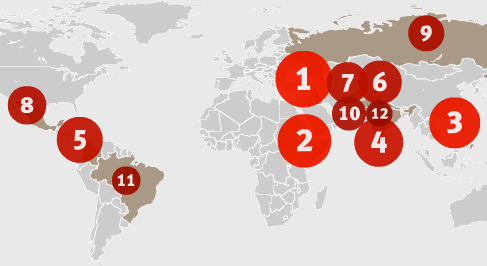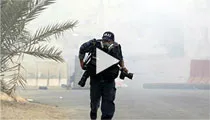Journalists faced resurgent violence from illegal armed groups in the months before President Juan Manuel Santos’ government announced peace talks with the leftist guerrilla organization Revolutionary Armed Forces of Colombia. The group, also known as the FARC, held French reporter Roméo Langlois captive for more than a month, the first abduction of an international journalist in Colombia since 2003, according to CPJ research. Fernando Londoño, a radio talk show host and former high-ranking government official, was injured and his driver and bodyguard were killed in a targeted bombing in Bogotá. Police were also implicated in an instance of anti-press violence. In November, freelance journalist Guillermo Quiroz Delgado died after being arrested while covering a street protest in Sucre department. From his hospital bed, Quiroz said he had been assaulted by police officers. Decisions in several legal cases favored the press. Angered by criticism in an opinion piece, the seven justices of the Supreme Court’s criminal chamber filed an unprecedented criminal defamation complaint against columnist Cecilia Orozco Tascón—but dropped the case after widespread criticism. The chief prosecutor’s office classified the 2000 kidnapping and sexual assault of journalist Jineth Bedoya as a crime against humanity and thus not subject to the statute of limitation. And two former officials of the national intelligence agency, or DAS, were sentenced to six years each in prison for an illegal espionage program that targeted critical journalists among others.
Colombia
» Illegal armed groups renew anti-press violence; police suspected in reporter’s death.
» New convictions won in espionage that targeted journalists.
Journalists faced resurgent violence from illegal armed groups in the months before President Juan Manuel Santos’ government announced peace talks with the leftist guerrilla organization Revolutionary Armed Forces of Colombia. The group, also known as the FARC, held French reporter Roméo Langlois captive for more than a month, the first abduction of an international journalist in Colombia since 2003, according to CPJ research. Fernando Londoño, a radio talk show host and former high-ranking government official, was injured and his driver and bodyguard were killed in a targeted bombing in Bogotá. Police were also implicated in an instance of anti-press violence. In November, freelance journalist Guillermo Quiroz Delgado died after being arrested while covering a street protest in Sucre department. From his hospital bed, Quiroz said he had been assaulted by police officers. Decisions in several legal cases favored the press. Angered by criticism in an opinion piece, the seven justices of the Supreme Court’s criminal chamber filed an unprecedented criminal defamation complaint against columnist Cecilia Orozco Tascón—but dropped the case after widespread criticism. The chief prosecutor’s office classified the 2000 kidnapping and sexual assault of journalist Jineth Bedoya as a crime against humanity and thus not subject to the statute of limitation. And two former officials of the national intelligence agency, or DAS, were sentenced to six years each in prison for an illegal espionage program that targeted critical journalists among others.
CPJ’s Impunity Index found that Colombia is the world’s fifth worst nation in combating deadly anti-press violence. At least eight journalist murders are unsolved over the past decade.

| 1. Iraq 2. Somalia 3. Philippines 4. Sri Lanka | 5. Colombia 6. Nepal 7. Afghanistan 8. Mexico | 9. Russia 10. Pakistan 11. Brazil 12. India |
CPJ research found that three Colombian journalists were forced to flee to other parts of the country in 2012 after receiving threats related to their reporting. Since 2007, nine Colombian journalists have been forced to flee their homes, according to CPJ’s analysis. Only one has returned.
| 4 | Went into exile |
| 5 | Internally displaced |
The statutes of limitation for the murders of journalists Jon Félix Tirado and José Domingo Cortés expired in 2012. The cases can no longer be prosecuted. In recent months, the authorities could not even say who was supposed to have been leading the investigations.
20 years
Statute of limitation for murders committed before 201030 years
Statute of limitation for murders committed after 2010, according to a reform passed by Congress10
Unsolved journalist murders for which the statute of limitations expired in 20115
Unsolved journalist murders for which the statute of limitations will expire by the end of 2014The 92 threats documented through December 7 put Colombia on pace to exceed levels recorded over the past five years, according to the Foundation for Freedom of the Press, or FLIP. The group found that threats were particularly common in the states Antioquia, Arauca, Cauca, César, Magdalena, Tolima, and Valle, which have seen the greatest overall violence connected to the country’s armed conflict.
* 2012 figure as of December 7

